最好的最全的最专业的英语诗歌鉴赏
- 格式:doc
- 大小:83.00 KB
- 文档页数:24
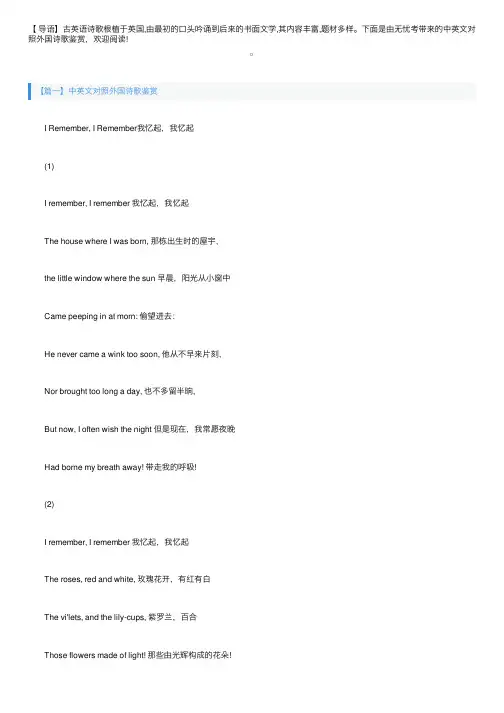
【导语】古英语诗歌根植于英国,由最初的⼝头吟诵到后来的书⾯⽂学,其内容丰富,题材多样。
下⾯是由⽆忧考带来的中英⽂对照外国诗歌鉴赏,欢迎阅读!【篇⼀】中英⽂对照外国诗歌鉴赏 I Remember, I Remember我忆起,我忆起 (1) I remember, I remember 我忆起,我忆起 The house where I was born, 那栋出⽣时的屋宇, the little window where the sun 早晨,阳光从⼩窗中 Came peeping in at morn: 偷望进去: He never came a wink too soon, 他从不早来⽚刻, Nor brought too long a day, 也不多留半晌, But now, I often wish the night 但是现在,我常愿夜晚 Had borne my breath away! 带⾛我的呼吸! (2) I remember, I remember 我忆起,我忆起 The roses, red and white, 玫瑰花开,有红有⽩ The vi'lets, and the lily-cups, 紫罗兰,百合 Those flowers made of light! 那些由光辉构成的花朵! The lilacs where the robin built, 有知更鸟筑巢的紫丁⾹, And where my brother set 有哥哥⽣⽇时 The laburnum on his birthday,-- 种植的⾦炼花,-- The tree is living yet! 依然常青! (3) I remember, I remember 我忆起,我忆起 Where I was used to swing 经常荡秋千的地⽅ and thought the air must rush as fresh 迎⾯⽽来的风是如此清爽 To swallows on the wing; 飞燕也颇有同感; My spirit flew in feathers then, 昔⽇意⽓扬扬的⼼灵, That is so heavy now, 现在变得如此沉重, And summer pools could hardly cool 就是夏⽇的池⽔也⽆法冷却 The fever on my brow! 我额头的热狂! (4) I remember, I remember 我忆起,我忆起 The fir trees dark and high; 茂密⾼耸的冷杉; I used to think their slender tops 我曾想象它细长的枝尖 Were close against the sky; 逼近天空; It was a childish ignorance, 虽然只是幼稚⽆知, But now 'tis little joy 但是,现在却少有那般快乐 To know I'm farther off from heav'n 因为我知道⾃⼰⽐孩童时代 Than when I was a boy! 离苍穹更遥远了! by Thomas Hood, 1799-1845【篇⼆】中英⽂对照外国诗歌鉴赏 The Daffodils ⽔仙花 (1) I wander'd lonely as a cloud 我像⼀朵浮云独⾃漫游 That floats on high o'er vales and hills, 飘过深⾕群⼭, When all at once I saw a crowd, 突然间,看到⼀⽚ A host of golden daffodils, ⽆数朵的⾦⾊⽔仙花, Beside the lake, beneath the trees, 长在湖畔,长在树下, Fluttering and dancing in the breeze. 微风中翩翩起舞。
![优美的英语诗歌[意境优美的英语诗歌鉴赏]](https://uimg.taocdn.com/0d540a225fbfc77da369b1a5.webp)
优美的英语诗歌[意境优美的英语诗歌鉴赏]意境优美的英语诗歌鉴赏意境优美的英语诗歌鉴赏意境优美的英语诗歌篇一As imperceptibly as grief Emily Dickinson The summer lapsed away,—Too imperceptible, at last, To seem like perfidy. A quietness distilled, As twilight long begun, Or Nature, spending with herself Sequestered afternoon. The dusk drew earlier in, The morning foreign shone,— A courteous, yet harrowing grace, As guest who would be gone. And thus, without a wing, Or service of a keel, Our summer made her light escape Into the beautiful. 夏之逃逸余光中译不知不觉地,有如忧伤,夏日竟然就逝了,如此地难以觉察,简直不像是有意潜逃向晚的微光很早就开始沉淀出一片寂静,不然便是消瘦的四野,将下午深深幽禁。
黄昏比往日来得更早,清晨的光采已陌生―― 一种拘礼而恼人的风度象即欲离去的客人。
就象如此,也不用翅膀,也不劳小舟相送。
我们的夏日轻逸地逃去,没入了美的境中。
意境优美的英语诗歌篇二I wandered lonely as a cloud 我似流云天自游William Wordsworth I wandered lonely as a cloud 我独游于天际,如一朵流云Th at floats on high o“er vales and hills,凌空于谷峰,飘然然悠闲。
When all at once I saw a crowd, 忽地,我看见了一群,A host, of golden daffodils;一簇簇金黄色的水仙;Beside the lake, beneath the trees, 看在树之荫,湖之缘,Fluttering and dancing in the breeze. 在微风中,她们舞姿翩翩。
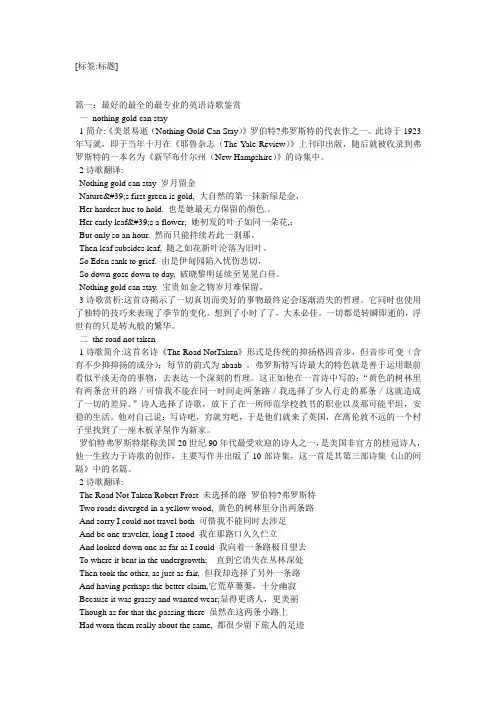
[标签:标题]篇一:最好的最全的最专业的英语诗歌鉴赏一nothing gold can stay1简介:《美景易逝(Nothing Gold Can Stay)》罗伯特?弗罗斯特的代表作之一。
此诗于1923年写就,即于当年十月在《耶鲁杂志(The Yale Review)》上刊印出版,随后就被收录到弗罗斯特的一本名为《新罕布什尔州(New Hampshire)》的诗集中。
2诗歌翻译:Nothing gold can stay 岁月留金Nature's first green is gold, 大自然的第一抹新绿是金,Her hardest hue to hold. 也是她最无力保留的颜色.。
Her early leaf's a flower; 她初发的叶子如同一朵花,;But only so an hour. 然而只能持续若此一刹那。
Then leaf subsides leaf, 随之如花新叶沦落为旧叶。
So Eden sank to grief. 由是伊甸园陷入忧伤悲切,So down gose down to day, 破晓黎明延续至晃晃白昼。
Nothing gold can stay. 宝贵如金之物岁月难保留。
3诗歌赏析:这首诗揭示了一切真切而美好的事物最终定会逐渐消失的哲理。
它同时也使用了独特的技巧来表现了季节的变化。
想到了小时了了,大未必佳。
一切都是转瞬即逝的,浮世有的只是转丸般的繁华。
二the road not taken1诗歌简介:这首名诗《The Road NotTaken》形式是传统的抑扬格四音步,但音步可变(含有不少抑抑扬的成分);每节的韵式为abaab 。
弗罗斯特写诗最大的特色就是善于运用眼前看似平淡无奇的事物,去表达一个深刻的哲理。
这正如他在一首诗中写的:“黄色的树林里有两条岔开的路/可惜我不能在同一时间走两条路/我选择了少人行走的那条/这就造成了一切的差异。
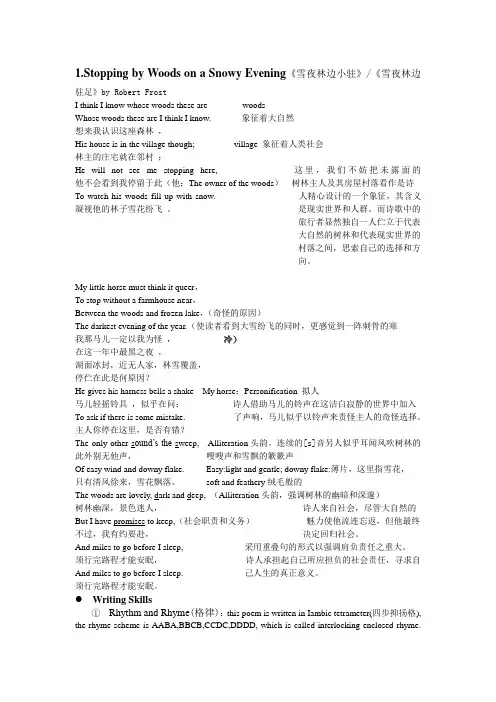
1.Stopping by Woods on a Snowy Evening《雪夜林边小驻》/《雪夜林边驻足》by Robert FrostI think I know whose woods these are woodsWhose woods these are I think I know.象征着大自然想来我认识这座森林,His house is in the village though; village象征着人类社会林主的庄宅就在邻村;He will not see me stopping here,这里,我们不妨把未露面的他不会看到我停留于此(他:The owner of the woods)树林主人及其房屋村落看作是诗To watch his woods fill up with snow. 人精心设计的一个象征,其含义凝视他的林子雪花纷飞。
是现实世界和人群。
而诗歌中的旅行者显然独自一人伫立于代表大自然的树林和代表现实世界的村落之间,思索自己的选择和方向。
My little horse must think it queer,To stop without a farmhouse near,Between the woods and frozen lake,(奇怪的原因)The darkest evening of the year.(使读者看到大雪纷飞的同时,更感觉到一阵刺骨的寒我那马儿一定以我为怪,冷)在这一年中最黑之夜,湖面冰封,近无人家,林雪覆盖,停伫在此是何原因?He gives his harness bells a shake My horse:Personification 拟人马儿轻摇铃具,似乎在问:诗人借助马儿的铃声在这洁白寂静的世界中加入To ask if there is some mistake. 了声响,马儿似乎以铃声来责怪主人的奇怪选择。
主人你停在这里,是否有错?The only other s ound’s the sweep, Alliteration头韵。
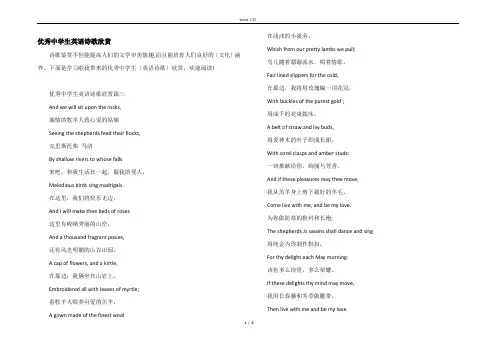
优秀中学生英语诗歌欣赏诗歌鉴赏不但能提高人们的文学审美情趣,而且能培育人们良好的〔文化〕涵养。
下面是学习啦我带来的优秀中学生〔英语诗歌〕欣赏,欢迎阅读!优秀中学生英语诗歌欣赏篇三And we will sit upon the rocks,激情的牧羊人致心爱的姑娘Seeing the shepherds feed their flocks,克里斯托弗马洛By shallow rivers to whose falls来吧,和我生活在一起,做我的爱人,Melodious birds sing madrigals.在这里,我们将快乐无边,And I will make thee beds of roses这里有峻峭秀丽的山峦,And a thousand fragrant posies,还有风光明媚的山谷田园。
A cap of flowers, and a kirtle,在那边,我俩坐在山岩上,Embroidered all with leaves of myrtle;看牧羊人喂养可爱的羔羊,A gown made of the finest wool 在浅浅的小溪旁,Which from our pretty lambs we pull;鸟儿随着潺潺流水,唱着情歌。
Fair lined slippers for the cold,在那边,我将用玫瑰编一顶花冠,With buckles of the purest gold ;用成千的花束做床,A belt of straw and ivy buds,用爱神木的叶子织成长裙,With coral clasps and amber studs:一切都献给你,绚丽与芳香。
And if these pleasures may thee move,我从羔羊身上剪下最好的羊毛,Come live with me, and be my love.为你做防寒的鞋衬和长袍;The shepherds Js swains shall dance and sing 用纯金为你制作鞋扣,For thy delight each May morning:该有多么珍贵,多么荣耀。

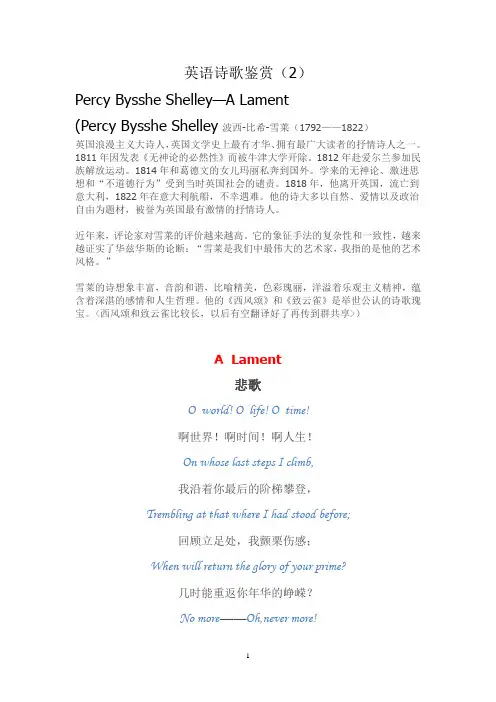
英语诗歌鉴赏(2)Percy Bysshe Shelley—A Lament(Percy Bysshe Shelley波西-比希-雪莱(1792——1822)英国浪漫主义大诗人,英国文学史上最有才华、拥有最广大读者的抒情诗人之一。
1811年因发表《无神论的必然性》而被牛津大学开除。
1812年赴爱尔兰参加民族解放运动。
1814年和葛德文的女儿玛丽私奔到国外。
学来的无神论、激进思想和“不道德行为”受到当时英国社会的谴责。
1818年,他离开英国,流亡到意大利,1822年在意大利航船,不幸遇难。
他的诗大多以自然、爱情以及政治自由为题材,被誉为英国最有激情的抒情诗人。
近年来,评论家对雪莱的评价越来越高。
它的象征手法的复杂性和一致性,越来越证实了华兹华斯的论断:“雪莱是我们中最伟大的艺术家,我指的是他的艺术风格。
”雪莱的诗想象丰富,音韵和谐,比喻精美,色彩瑰丽,洋溢着乐观主义精神,蕴含着深湛的感情和人生哲理。
他的《西风颂》和《致云雀》是举世公认的诗歌瑰宝。
<西风颂和致云雀比较长,以后有空翻译好了再传到群共享>)A Lament悲歌O world! O life! O time!啊世界!啊时间!啊人生!On whose last steps I climb,我沿着你最后的阶梯攀登,Trembling at that where I had stood before;回顾立足处,我颤栗伤感;When will return the glory of your prime?几时能重返你年华的峥嵘?No more——Oh,never more!不再还——啊,永不再还!Out of the day and night从一个个逝去的日日夜夜,A joy has taken flight;有种欢情已插翅飞去而别;Fresh spring,and summer,and winter hoar,初春,夏秋和严冬以忧烦Move my faint heart with grief,but with delight搅动我迷惘的心,喜悦却No more——Oh,never more!不再还——啊,永不再还!【诗歌赏析】《哀歌》并非简单的对于生命即将逝去的伤感,尽管这首诗冥冥之中出现于雪莱死前的创作。
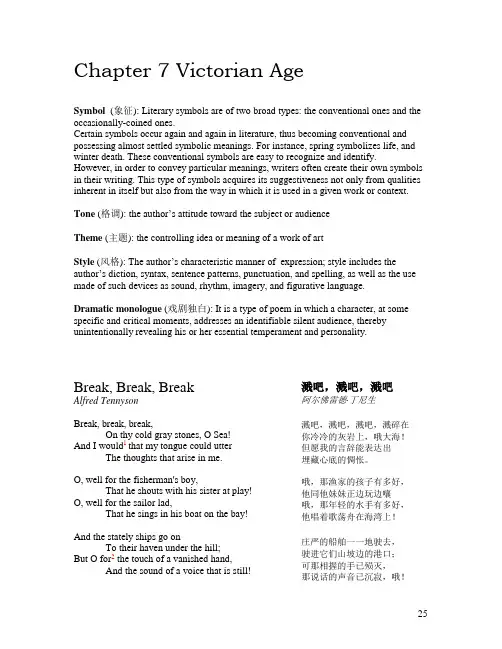
Chapter 7 Victorian AgeSymbol (象征): Literary symbols are of two broad types: the conventional ones and the occasionally-coined ones.Certain symbols occur again and again in literature, thus becoming conventional and possessing almost settled symbolic meanings. For instance, spring symbolizes life, and winter death. These conventional symbols are easy to recognize and identify. However, in order to convey particular meanings, writers often create their own symbols in their writing. This type of symbols acquires its suggestiveness not only from qualities inherent in itself but also from the way in which it is used in a given work or context.Tone (格调): the author’s attitude toward the subject or audienceTheme (主题): the controlling idea or meaning of a work of artStyle (风格): The author’s characteristic manner of expression; style includes the author’s diction, syntax, sentence patterns, punctuation, and spelling, as well as the use made of such devices as sound, rhythm, imagery, and figurative language.Dramatic monologue (戏剧独白): It is a type of poem in which a character, at some specific and critical moments, addresses an identifiable silent audience, thereby unintentionally revealing his or her essential temperament and personality.Notes1.I would : I wish2.O for : how I wish for3. the tender grace : 诗人与亡友之间的友谊Questions:1. Why does the poet describe the stones as “cold ” and “gray ”?2. What effect do the joyful scenes in the second stanza bring to the whole poem?3. Whose is the “voice that is still ”?Sophocles 3 long agoHeard it on the Agaean, and it brought Into his mind the turbid ebb and flow Of human misery; weFind also in the sound a thought,Hearing it by this distant northern sea.Was once, too, at the full, and round earth's shoreLay like the folds of a bright girdle4 furled.But now I only hear5Its melancholy, long, withdrawing roar,Retreating, to the breathOf the night-wind, down the vast edges drearAnd naked shingles of the world.Ah, love, let us be trueTo one another! for the world, which seemsTo lie before us like a land of dreams,So various, so beautiful, so new,Hath really neither joy, nor love, nor light,Nor certitude, nor peace, nor help for pain;And we are here as on a darkling plainSwept with confused alarms of struggle and flight,Where ignorant armies clash by night.Notes1.moon-blanched: whitened by the light of the moon.2. A grating roar: Here, grating introduces conflict between the sea and the land and, symbolically, between long-held religious beliefs and the challenges against them.3. Sophocles . . . Aegean: In his play Antigone, Sophocles says the gods can visit ruin on people from one generation to the next, like a swelling tide driven by winds.4. girdle: sash, belt; anything that surrounds or encircles5. I only hear: I alone hear6. Where . . . night: E.K. Brown and J.O. Bailey suggest that this line is an allusion to Greek historian Thucydides' account of the Battle of Epipolae (413 B.C.), a walled fortress near the city of Syracuse on the island of Sicily. In that battle, Athenians fought an army of Syracusans at night. In the darkness, the combatants lashed out blindly at one another. Brown and Bailey further observe that the line "suggests the confusion of mid-Victorian values of all kinds . . .”Questions:1.Is it the sea that brings the eternal sadness to the poet? Or is it the poetwho brings the sadness to the sea?2.In what ways does the sea resemble Faith?3.What is the suggested cure for the faithless world in the poem?。
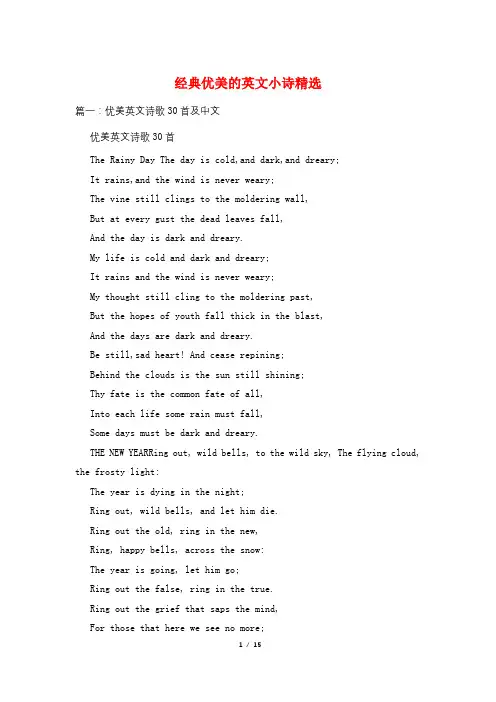
经典优美的英文小诗精选篇一:优美英文诗歌30首及中文优美英文诗歌30首The Rainy Day The day is cold,and dark,and dreary;It rains,and the wind is never weary;The vine still clings to the moldering wall,But at every gust the dead leaves fall,And the day is dark and dreary.My life is cold and dark and dreary;It rains and the wind is never weary;My thought still cling to the moldering past,But the hopes of youth fall thick in the blast,And the days are dark and dreary.Be still,sad heart! And cease repining;Behind the clouds is the sun still shining;Thy fate is the common fate of all,Into each life some rain must fall,Some days must be dark and dreary.THE NEW YEARRing out, wild bells, to the wild sky, The flying cloud, the frosty light:The year is dying in the night;Ring out, wild bells, and let him die.Ring out the old, ring in the new,Ring, happy bells, across the snow:The year is going, let him go;Ring out the false, ring in the true.Ring out the grief that saps the mind,For those that here we see no more;Ring out the feud of rich and poor,Ring in redress to all mankind.The Seaside Is My Home I live near the sea for years. The billow sound every night, Enlightens me how to be great,And how to look on greatness.Without seeing great mountains,I form no habit of looking up.I live near the sea for years.Too much water, saltier than tears,Floats some directional boats,Or other drifting boatsTo travel far across the sea.So the shore is always in my heart.I live near the sea for years.With more floaters on the sea,Sweet and LowSweet and low , sweet and low,Wind of the western sea,Low, low, breathe and blow,Wind of the western sea!Over the rolling waters go,Come from the dying noon, and blow,Blow him again to me;While my little one, while my pretty one, sleeps. Sleep and rest, sleep and rest,Father will come to thee soon;Rest, rest on mother s breast,Father will come to thee soon;Father will come to his babe in the nest, Silver sails all out of the westUnder the silver moon;Sleep, my little one, sleep, my pretty one, sleep. I Felt the Sunlight Along the long, long corridorI go on walking . . .—Before me there are dazzling windows, on either side, walls reflecting the light. The sunlight and I,I m standing with the sunlight.—Now I remember how intense that sunlight is! So warm it stops me from taking another step, so bright I hold my breath.The light of the whole universe converges here. —I m unaware of the existence of anything else. There is only me, leaning on sunlight, still for a full ten seconds.Sometimes, ten secondsis longer than a quarter of a century. Finally, I dash down the stairs, push open the door,and run in the spring sunlight … Ask me no moreAsk me no more where Jove bestows, When June is past, the fading rose; For in your beauty’s orient deep,These flowers, as in their causes, sleep. Ask me no more whither do stray The golden atoms of the day;For in pure love heaven did prepare Those powders to eich your hair. Ask me no more whither doth haste The nightingale, when May is past; For in your sweet dividing throatShe winters, and keeps warm her note. Ask me no more where those stars light, That downwards fall in dead of night; For in your eyes they sit, and there Fixed become, as in their sphere.Here we stand togetherHere we stand together,Dressed in our pain,Covered with scarsFrom wounds we did not ask for Or deserve.So what now?We can t go backAnd relive our lives.We can t take backThe innocence we lostOr make the sadness we felt Into happiness.I Think I CanIf you think you are beaten, you are; If you think you dare not, you don If you want to win but think you can It s almost a cinch you won t. If you think you ll lose, you re lost; For out of the world we find Success begins with a fellow s will; It s all in a state of mind. Life s battles don t always go To the stronger and faster man,篇二:最好的最全的最专业的英语诗歌鉴赏一 nothing gold can stay1简介:《美景易逝〔Nothing Gold Can Stay〕》罗伯特?弗罗斯特的代表作之一。
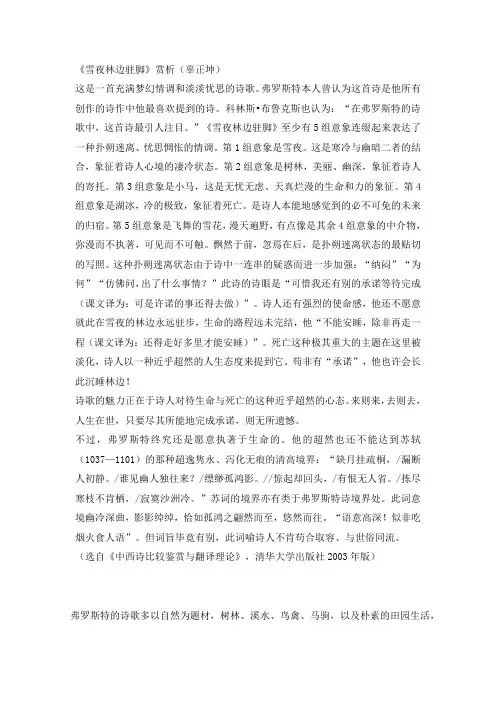
《雪夜林边驻脚》赏析(辜正坤)这是一首充满梦幻情调和淡淡忧思的诗歌。
弗罗斯特本人曾认为这首诗是他所有创作的诗作中他最喜欢提到的诗。
科林斯•布鲁克斯也认为:“在弗罗斯特的诗歌中,这首诗最引人注目。
”《雪夜林边驻脚》至少有5组意象连缀起来表达了一种扑朔迷离、忧思惆怅的情调。
第1组意象是雪夜。
这是寒冷与幽暗二者的结合,象征着诗人心境的凄冷状态。
第2组意象是树林,美丽、幽深,象征着诗人的寄托。
第3组意象是小马,这是无忧无虑、天真烂漫的生命和力的象征。
第4组意象是湖冰,冷的极致,象征着死亡。
是诗人本能地感觉到的必不可免的未来的归宿。
第5组意象是飞舞的雪花,漫天遍野,有点像是其余4组意象的中介物,弥漫而不执著,可见而不可触。
飘然于前,忽焉在后,是扑朔迷离状态的最贴切的写照。
这种扑朔迷离状态由于诗中一连串的疑惑而进一步加强:“纳闷”“为何”“仿佛问,出了什么事情?”此诗的诗眼是“可惜我还有别的承诺等待完成(课文译为:可是许诺的事还得去做)”。
诗人还有强烈的使命感,他还不愿意就此在雪夜的林边永远驻步,生命的路程远未完结,他“不能安睡,除非再走一程(课文译为:还得走好多里才能安睡)”。
死亡这种极其重大的主题在这里被淡化,诗人以一种近乎超然的人生态度来提到它。
苟非有“承诺”,他也许会长此沉睡林边!诗歌的魅力正在于诗人对待生命与死亡的这种近乎超然的心态。
来则来,去则去,人生在世,只要尽其所能地完成承诺,则无所遗憾。
不过,弗罗斯特终究还是愿意执著于生命的。
他的超然也还不能达到苏轼(1037—1101)的那种超逸隽永、泻化无痕的清高境界:“缺月挂疏桐,/漏断人初静。
/谁见幽人独往来?/缥缈孤鸿影。
//惊起却回头,/有恨无人省。
/拣尽寒枝不肯栖,/寂寞沙洲冷。
”苏词的境界亦有类于弗罗斯特诗境界处。
此词意境幽冷深曲,影影绰绰,恰如孤鸿之翩然而至,悠然而往。
“语意高深!似非吃烟火食人语”。
但词旨毕竟有别,此词喻诗人不肯苟合取容、与世俗同流。
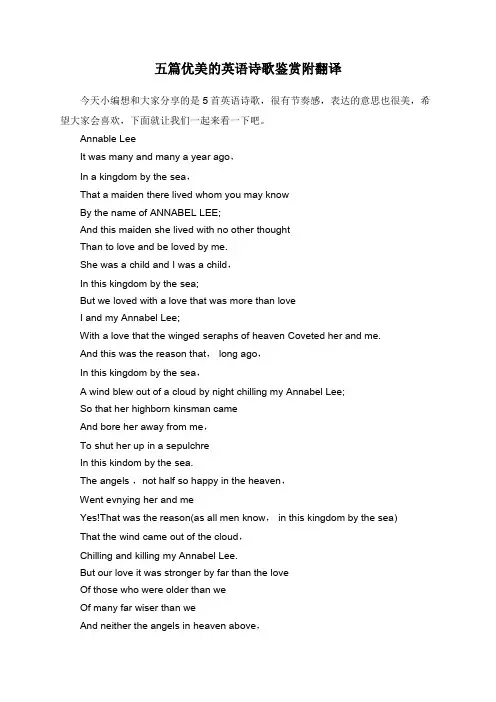
五篇优美的英语诗歌鉴赏附翻译今天小编想和大家分享的是5首英语诗歌,很有节奏感,表达的意思也很美,希望大家会喜欢,下面就让我们一起来看一下吧。
Annable LeeIt was many and many a year ago,In a kingdom by the sea,That a maiden there lived whom you may knowBy the name of ANNABEL LEE;And this maiden she lived with no other thoughtThan to love and be loved by me.She was a child and I was a child,In this kingdom by the sea;But we loved with a love that was more than loveI and my Annabel Lee;With a love that the winged seraphs of heaven Coveted her and me.And this was the reason that, long ago,In this kingdom by the sea,A wind blew out of a cloud by night chilling my Annabel Lee;So that her highborn kinsman cameAnd bore her away from me,To shut her up in a sepulchreIn this kindom by the sea.The angels ,not half so happy in the heaven,Went evnying her and meYes!That was the reason(as all men know, in this kingdom by the sea)That the wind came out of the cloud,Chilling and killing my Annabel Lee.But our love it was stronger by far than the loveOf those who were older than weOf many far wiser than weAnd neither the angels in heaven above,Nor the demons down under the sea,Can ever dissever my soulfrom the soulOf the beautiful Annabel Lee.For the moon never beams without bringing me dreams Of the beautiful Annalbel Lee;And the stars never rise but I see the bright eyesOf the beautiful Annabel Lee;And so,all the night-tide , I lie down by the sideOf my darling , my darling , my life and my bride,In the sepulchre there by the sea,In her tomb by the side of the sea很久很久以前,在一个滨海的国度里,住着一位少女你或许认得,她的芳名叫安娜贝尔.李;这少女活着没有别的愿望,只为和我俩情相许。
英语诗歌格律判断标准:音步(foot)英语中重读与非重读音节的特殊性组合,一个音步的音节数量可能为两个或三个音节,但不能少于两个或多于三个,而且其中只有一个必须重读。
格律(Metre)1.抑扬格(Iambus;theIambicFoot):一个音步由一个非重读音节加上一个重读音节构成。
2.扬抑格(Trochee;the Trochaic Foot):一个音步由一个重读音节加上一个非重读音节构成。
3.扬抑抑格(Dactyl):一个音步由一个重读音节加上两个非重读音节构成。
4.抑抑扬格(Anapest;the Anapestic Foot):一个音步由两个非重读音节加上一个重读音节构成。
5.抑扬抑格(Amphibrach;the Amphibrachy Foot):一个音步由三个音节组成,其中第一、三个音节为非重读音节,第二个音节为重读音节。
6.扬扬格(Spondee):一个音步由两个重读音节构成。
7.抑抑格(Pyrrhic):一个音步由两个非重读音节构成。
The Burial of Sir John Moore at Corunna《约翰·穆尔爵士的葬礼》By Charles Wolfe (1791–1823)察理·沃尔夫蒸馏译X X / X / X X / XX /Not a drum/ was heard,/ not a fu/neral note,X X / X X / X X / XAs his corse/ to the ram/part we hu/rried;X X / X X / X X / X /Not a sol/dier dischar/ged his fa/rewell shotX X / X X / X X / XO'er the grave/ where our he/ro we bu/ried.英雄的遗体被匆匆运抵城堡没有鼓乐没有讣告更没人在他长眠的墓前鸣枪以示告别X / X X / X X / X / We bu/ried him dar/kly at dead/ of night, X / X X / X / XThe sods/ with our bayo/nets turning;X X / X / X / X / By the stru/ggling moonbeam's/ misty light X X / X / X / XAnd the lan/tern dimly/ burning.夜深人静四周漆黑一团借着勉强透过迷雾的月光还有那昏暗的油灯我们用刺刀翻开草皮埋葬他X X / X X / X X / Array No useless/ coffin en/closed his breast,X X / X X / X / XNor in sheet/ nor in shroud/ we wound him;X X / X X / X / X X /But he lay/ like a wa/rrior taking/ his restX X / X X / X XWith his mar/tial cloak a/round him.棺椁盛不下他那撕裂的胸膛布单不可以裹尸布更不行看!身裹战袍的他犹如躺下休憩的战士X X / X X / X XFew and short/ were the prayers/ we said,X X / X X / X /And we spoke/ not a word/ of sorrow;X X / X X / X X / X X / But we stead/fastly gazed/ on the face/ that was dead,X X / X X / X X / XAnd we bi/tterly thought/ of the mo/rrow.悼词只有简短的几句措辞中不带一丝悲伤可当我们虔诚地凝神注视那逝者的面庞明日的酸楚不禁油然而生X / X X / X X / X /We thought/, as we ho/llowed his na/rrow bedX / X X / X / XAnd smoothed/ down his/ lonely/ pillow,X X / X X / X X / X X / That the foe/ and the stran/ger would tread/ o'er his head, X X / X / X X / XAnd we far/ away/ on the bi/llow!我们一边为孤独的英雄挖出一张狭小的床抚平他的枕头一边在想当我们乘风破浪远航时敌人和不知情的人会来践踏英雄的头颅/ X X X / X X / X X /Lightly/ they'll talk/ of the spi/rit that's goneX / X / X X / XAnd o'er/ his cold/ ashes upbraid/ him,--X / X X / X X / X X /But little/ he'll reck/, if they let/ him sleep onX X / X X / X X / XIn the grave/ where a Bri/ton has laid/ him.虽然他尸骨已寒但他们还是会侮辱咒骂这逝去的英灵只要他们能让他在同胞亲手下葬的墓地里安息他会对一切都毫不在意X / X X / X / X /But half/ of our hea/vy task/ was doneX X / X X / X / X When the clock/ struck the hour/ for retiring:X X / X / X X / X /And we heard/ the dis/tant and ran/dom gunX X / X / X X / XThat the foe/ was su/llenly fi/ring.刚刚艰难地挖了一半撤退的时间到了远处传来零星的炮声那是敌人战败后愤懑的报复/ X X / X X / X /Slowly/ and sad/ly we laid/ him down,X X / X X / X X / XFrom the field/ of his fame/ fresh and go/ry;X / X X / X X / X X /We carved/ not a line/, and we raised/ not a stone,X X / X X / X X / XBut we left/ him alone/ with his glo/ry.从这片他溅满鲜血留下英名的热土上我们满怀悲愤小心翼翼地将他抬起再放好没有为他树一块石碑更没有刻下一句墓志铭但他的光辉事迹将永载史册整首诗的节奏基本为三步抑抑扬格。
英文诗歌鉴赏英语作文英文:When it comes to appreciating English poetry, there are a few key things to keep in mind. First and foremost, it's important to understand the context in which the poem was written. This can include the time period, the author's background and experiences, and any cultural or historical references that may be present in the poem.Another important aspect of poetry appreciation is paying attention to the language itself. This includes things like the use of metaphors, similes, and otherliterary devices, as well as the rhythm and meter of the poem. It's also important to consider the tone and mood of the poem, as well as any themes or messages that the author may be trying to convey.One of my favorite poems is "The Love Song of J. Alfred Prufrock" by T.S. Eliot. This poem is a great example ofhow a skilled poet can use language to create a particular mood and atmosphere. The poem is full of vivid imagery and metaphorical language, which helps to create a sense of unease and uncertainty in the reader. The poem's use of repetition and fragmented syntax also adds to this sense of disorientation.Another example of a great poem is "Do Not Go Gentle into That Good Night" by Dylan Thomas. This poem is a powerful meditation on mortality and the human desire to cling to life. The poem's use of repetition and strong, declarative language helps to convey the urgency and intensity of the speaker's message. The poem's structure, which consists of five stanzas of three lines each followed by a final quatrain, also adds to its sense of power and momentum.中文:欣赏英语诗歌时,有几个关键点需要注意。
一nothing gold can stay1简介:《美景易逝(Nothing Gold Can Stay)》罗伯特•弗罗斯特的代表作之一。
此诗于1923年写就,即于当年十月在《耶鲁杂志(The Yale Review)》上刊印出版,随后就被收录到弗罗斯特的一本名为《新罕布什尔州(New Hampshire)》的诗集中。
2诗歌翻译:Nothing gold can stay 岁月留金Nature's first green is gold, 大自然的第一抹新绿是金,Her hardest hue to hold. 也是她最无力保留的颜色.。
Her early leaf's a flower; 她初发的叶子如同一朵花,;But only so an hour. 然而只能持续若此一刹那。
Then leaf subsides leaf, 随之如花新叶沦落为旧叶。
So Eden sank to grief. 由是伊甸园陷入忧伤悲切,So down gose down to day, 破晓黎明延续至晃晃白昼。
Nothing gold can stay. 宝贵如金之物岁月难保留。
3诗歌赏析:这首诗揭示了一切真切而美好的事物最终定会逐渐消失的哲理。
它同时也使用了独特的技巧来表现了季节的变化。
想到了小时了了,大未必佳。
一切都是转瞬即逝的,浮世有的只是转丸般的繁华。
二the road not taken1诗歌简介:这首名诗《The Road NotTaken》形式是传统的抑扬格四音步,但音步可变(含有不少抑抑扬的成分);每节的韵式为abaab 。
弗罗斯特写诗最大的特色就是善于运用眼前看似平淡无奇的事物,去表达一个深刻的哲理。
这正如他在一首诗中写的:“黄色的树林里有两条岔开的路/可惜我不能在同一时间走两条路/我选择了少人行走的那条/这就造成了一切的差异。
”诗人选择了诗歌,放下了在一所师范学校教书的职业以及那可能平坦,安稳的生活。
他对自己说:写诗吧,穷就穷吧,于是他们就来了英国,在离伦敦不远的一个村子里找到了一座木板茅屋作为新家。
罗伯特弗罗斯特堪称美国20世纪90年代最受欢迎的诗人之一,是美国非官方的桂冠诗人,他一生致力于诗歌的创作,主要写作并出版了10部诗集,这一首是其第三部诗集《山的间隔》中的名篇。
2诗歌翻译:The Road Not Taken Robert Frost 未选择的路罗伯特•弗罗斯特Two roads diverged in a yellow wood, 黄色的树林里分出两条路And sorry I could not travel both 可惜我不能同时去涉足And be one traveler, long I stood 我在那路口久久伫立And looked down one as far as I could 我向着一条路极目望去To where it bent in the undergrowth; 直到它消失在丛林深处Then took the other, as just as fair, 但我却选择了另外一条路And having perhaps the better claim, 它荒草萋萋,十分幽寂Because it was grassy and wanted wear; 显得更诱人,更美丽Though as for that the passing there 虽然在这两条小路上Had worn them really about the same, 都很少留下旅人的足迹And both that morning equally lay 虽然那天清晨落叶满地In leaves no step had trodden black. 两条路都未经脚印污染Oh, I kept the first for another day! 呵,留下一条路等改日再见Yet knowing how way leads on to way, 但我知道路径延绵无尽头I doubted if I should ever come back. 恐怕我难以再回返I shall be telling this with a sigh 也许多少年后在某一个地方Somewhere ages and ages hence: 我将轻声叹息把往事回顾Two roads diverged in a wood,and I—一片森林里分出两条路I took the one less traveled by, 而我却选择了人迹更少的一条And that has made al lthe difference.从此决定了我一生的道路3诗歌赏析:(1)诗歌特点:全诗共4节,可分两层:1—3节为第一层,在树林里,“我”面临着两条路,而经过思考决定选择了一条人迹罕至的路。
在这一层中,诗人描述了选择人迹罕至的路并不是草率决定的,而是经历了复杂的心理历程。
描述了“我”站在岔路口,为不能同时涉足两条路而遗憾,“我在那路口久久伫立”,写出“我”的犹豫和久久思索:一条路平坦通畅,极目可望见它的尽头;而另一条路幽寂荒凉,充满着引人探索的诱惑,但“无限美景在险峰”,“我”终于选择了那条人迹更少的路,就让另一条路留待后日去走,这显然是作者做出抉择后的一种自我安慰,因为“我知道路径延绵无尽头,/恐怕我难以再回返”,虽然如此,但依然义无返顾。
第4节为第二层,是作者多年以后的感慨,“我选择了人迹更少的一条,/从此决定了我一生的道路”。
这告诉我们,人的一生面临着无数的选择,而每一次选择都会对人生产生重要影响;一个人的一生怎样度过,就看他在人生的岔路口做出了怎样的选择,选择不同,命运就会不同。
(2)弗罗斯特在诗歌风格上的一个最大特点是朴素无华,含义隽永,把深刻的思考和哲理寓于平淡无奇的内容和简洁朴实的诗句之中。
本诗堪称是这方面的典范。
这首诗的语言质朴自然,但在构思上却非常巧妙。
我们不难看出,诗歌中所描写的岔路就是人生岔路的象征。
它说明,在人生的旅途中,我们时常必须要在两条道路、两种思想或两种行动中做出选择,不同的选择将决定不同的人生方向。
面对选择时,我们往往会变得犹豫不决,反复权衡,拿不定主意。
最后,我们终究会选择其中的一条路。
这首诗,描绘的是一个面临选择的人和他进行选择时的心态,至于选择的具体内容并没有写出,诗人的着眼点是选择本身。
每一个读者都能够在这首诗中发现自己的生活体验,体味其中的哲理。
因为这首诗具有丰富的内涵,给读者留下了想像的空间,从而受到触动,引发深深的思索。
这种每个人都有过的复杂的心理体验,被弗罗斯特敏感地捕捉到了,并谱写成一首脍炙人口的佳作.选择了荒芜的路,经历痛苦、磨难,旅途中不断回想起那条未选择的路。
“要是我走那条未选择的路,也许我就不会这般痛苦?”诗人写出了漫长人生路中的种种迷惘、惆怅。
全诗最后并没有指出诗人选择那条路以后最终的结局,只是说“And that has made all the difference”......三dust of snow1简介:见前面对作者弗罗斯特的介绍吧,这首诗歌也是他写的.2诗歌翻译:The way a crow 道上的一只乌鸦Shook down on me 向我俯冲而下The dust of snow 一尘落雪From a hemlock tree 从铁杉树上飘下(铁杉树因为常见于坟场,常代表死亡)Has given my heart 我原本沮丧的心房A change of mood 因这落雪而豁然And saved some part 并且赶走了一部分Of a day I had rued. 我今日的颓废阴暗或者铁杉树下雪尘簌簌洒我一身原是乌鸦摇我心怦怦好个微妙一日烦恼竟然大半销。
3诗歌赏析: 罗伯特弗罗斯特的雪尘只有八句,不包含任何形容词,甚至也没有明喻或隐喻,但成功地在读者的内心深处描绘了一副美丽的图画,是一首即兴小诗,浑若天成,不留琢痕.第一段写景,第二段抒情,表现了一种乐观的心态.四Richard Cory1诗歌简介: 埃德温•阿林顿•罗宾逊,此人是新英格兰人,与埃德加•李•马斯特斯同时代。
他终于未能成为第一流的诗人,这或许因为他在成年时代过於孤立,过於默默无闻,或许也因为他性格上的不足,对於时代的反应犹豫不决,诸多挑剔。
他起初对左拉和哈代极感兴趣,想写小说,后来尝试了;失败了;逐渐脱离小说,而在琢磨的过程中形成了自己的诗风。
对他而言,那是一个痛苦而受屈的过程,虽然他的第一本诗集早於一八九六年自费出版,但迟至一九二○年代人们才对他加以推祟。
那时,他的成就已经相当可观,前后得了三次普立兹奖。
也许这个事实正足以说明他没有能真正成得大器的原因。
他在这二十多年内没有多大变化,以一般读者的趣味,这时还不能接受其他"现代"诗人,但已经大致可以接受他的诗了。
他的忧心、苦思、悲观的诗篇和习见的作品差不多,但好得多。
他早期有许多诗,写孤独、任性、无所适从、缺乏安全感的人,行文极其细致,有时能够恰如其分地获得新英格兰那种淳朴口语的真趣。
2诗歌翻译:Richard Cory- Edwin Arlington Robinson -" The Children Of The Night " 理查.珂利Whenever Richard Cory went down town, 每当理查.珂利走进闹市We people on the pavement looked at him: 我们,街上的人,两眼瞪圆He was a gentleman from sole to crown, 他从头到脚都是地道的绅士Clean favored, and imperially slim. 潇洒纤瘦,风度翩翩And he was always quietly arrayed, 他衣着永远淡雅素净,And he was always human when he talked; 他谈吐永远文质彬彬,But still he fluttered pulses when he said, 当他向人问好,人们不禁"Good-morning," and he glittered when he walked. 怦然心动,他走路光彩照人And he was rich - yes, richer than a king - 他有钱---是的,富比王侯And admirably schooled in every grace; 令人钦佩的读遍各种学问In fine we thought that he was everything 总而言之,他是无所不有,To make us wish that we were in his place. 谁都盼望有他的福份So on we worked, and waited for the light, 我们苦干,等着福光降临And went without the meat, and cursed the bread; 整月没肉吃,面包讨人嫌And Richard Cory, one calm summer night, 而理查.珂利,在宁静的夏夜Went home and put a bullet through his head. 回家朝自己脑袋放一颗子弹3诗歌赏析: 一个人拥有的财富、才华与他的快乐不成正比。